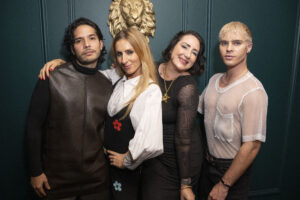Soft fabric and gentle stitching typically evoke childhood comfort, but one company has transformed the humble plush toy into something far more profound. Plushie Dreadfuls creates nearly 300 different stuffed animals that represent mental health conditions, chronic illnesses, and complex identities that society often keeps hidden.
These are not typical teddy bears designed for nurseries. Instead, they serve as tangible companions for adults navigating depression, anxiety, PTSD, autism, and countless other experiences that can leave people feeling isolated and misunderstood.
Plushie Dreadfuls emerged from deeply personal pain. American McGee’s own history includes childhood trauma, generational abuse, and complex PTSD that inspired his acclaimed Alice video game series. Rather than hiding these experiences, he chose to transform them into something that could offer comfort to others walking similar paths. Each toy becomes a bridge between internal struggle and external validation, giving form to feelings that often remain nameless and unacknowledged.
The designs themselves speak volumes about the longing for representation in unseen communities. From Anxiety Rabbits to Trust Issues Bunnies, each plushie says: You are not alone. They give presence and shape to realities that often go unspoken and that, in itself, is revolutionary.
The Creative Process and Shadow Integration
The aesthetic deliberately embraces what McGee calls the “stitched and dreadful style,” plushies that look beautifully broken, complete with visible patches and imperfections that mirror the human experience. Rather than presenting sanitized versions of mental health conditions, these designs acknowledge the messy, complicated reality of living with invisible struggles.
“I believe in facing your fears and using the difficulties of life as catalysts for positive transformation and personal growth,” McGee explains. “Instead of hiding our issues and stigmatizing them, we should drag them out into the light and expose them for all to see. In this way, we rob them of the power to control us.” This philosophy permeates every aspect of Plushie Dreadfuls’ design process.
A Depression Rabbit might feature a semicolon symbol representing hope after suicidal ideation, while a Trust Issues Bunny carries symbolic representations of past betrayals alongside gentle reminders that healing remains possible.
The company also pioneered something called “Crowd Design,” a collaborative creation method borrowed from the video game world. People living with specific conditions are invited to contribute ideas, ensuring that each plushie goes beyond surface-level symbolism. The result is a deeply authentic, co-created expression of lived experience that resonates on both personal and communal levels.
Building Community Through Shared Struggles
The therapeutic impact of these plushies stretches far beyond personal comfort. Plushie Dreadfuls have become conversation starters, visible symbols that help people recognize others who share similar journeys. These companions break the ice, soften difficult moments, and provide a physical anchor for stories that are often hard to tell.
Many customers describe its plushies as tools to explain their conditions to family members, friends, or therapists. These toys become emotional translators, gentle, huggable ways of saying what words sometimes cannot. Parents use them to help children understand their feelings, while adults lean on them during panic attacks or moments of deep sadness.
What makes the Plushie Dreadfuls community especially unique is the way it welcomes those with rare conditions or identities that often lack mainstream acknowledgment. Through the crowd design process, individuals with everything from Ehlers-Danlos Syndrome to gender dysphoria help shape plushies that reflect their personal realities. It transforms the consumer into a co-creator, and healing becomes a shared act.
Personal Transformation Through Symbolic Healing
The psychological benefits of these plushies tap into the therapeutic concept of transitional objects, comfort items that help people navigate emotional challenges. Many mental health professionals report patients bringing Plushie Dreadfuls into therapy as tools for expressing things too overwhelming to verbalize. The softness, the symbolism, the vulnerability stitched into every piece, these qualities ground and guide people through the healing process.
“We can never fully recover from the traumas and issues we encounter throughout life,” McGee says. That realism shapes the heart of Plushie Dreadfuls. It does not offer quick fixes or empty positivity. Instead, they model a kind of self-acceptance that includes our scars. The visible stitches are proof of survival.
Ultimately, Plushie Dreadfuls proves that healing does not always look clinical or traditional. Sometimes, it looks like a stitched bunny with anxiety, or a rabbit carrying your trauma in its arms. In these plushies, people find not just comfort, but recognition, community, and the quiet affirmation that their struggles are seen, their stories matter, and softness can be strong.








